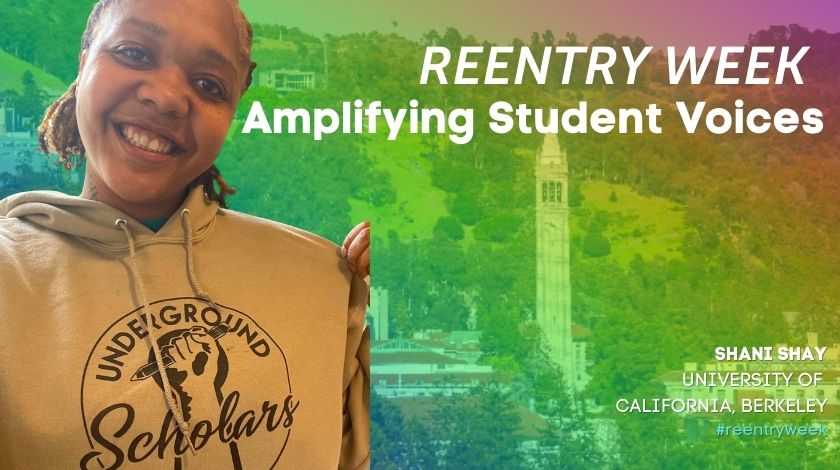As part of our Student-Centered Reentry Week Campaign, we’re featuring inspiring stories of justice-involved scholars, such as Shani Shay. Shani is a student at the University of California, Berkeley, where she is set to graduate in 2022.
Shani, what are your academic and career aspirations?
Long-term, I would like to be Secretary of Education, but for now, I’m focused on building programming for Incarceration to College—an in-custody college outreach program. We connect individuals who’ve been to juvenile detention with counseling, internships, and support systems that help them pursue higher education. I want to make sure I can train other instructors and increase the college and career aspirations of all students including justice-involved scholars. In terms of academics, I’m considering pursuing a Master’s or even a Ph.D. degree in education.
Tell us about your story and any challenges that you may have faced in your reentry process.
Education saved my life, and it’s been my access to freedom. I was a domestic violence survivor up until I was thirty years old, and I was stuck in a spiral of criminal behavior. I enrolled in community college at Laney College, but I didn’t have financial aid and ended up going back to jail for eight months. It was difficult being away from my newborn daughter for so long. I was supposed to be in jail longer, but my professors wrote letters that enabled me to be released eight months into a three-year sentence.
After I was released, I started working, and by pure coincidence one of my professors from Laney College, Dr. Angela Cherry, stopped by and asked if I was returning to school. I told her that I didn’t have any financial aid—she returned with half the money, so I mustered up the other half and I went back to complete my Associate Degree.
Describe any challenges you had with housing during your reentry and educational journey.
I was with my ex, the father of my child, for thirteen years, but it was an abusive relationship that I escaped. I was homeless and sleeping on my mother’s couch in low-income housing along with my daughter. I finished community college and then enrolled in U.C. Berkeley, where I immediately became involved with the Berkeley Underground Scholars. The organization gave me a home and made me feel safe and comfortable. They allowed me to come into their space before I was registered as a student, and they helped me find scholarships.
What was missing in your reentry journey that would have helped you?
At the community college level, it was housing, specifically in California and the Bay Area. People do not have a place to stay, and if they do have a place to stay it is rarely safe. Also, mental health services are incredibly important. Additionally, the gatekeepers to internships and support systems often need better training and support to help them become more accessible and approachable to the people who require their services. Finally, funding to help students meet their basic needs is also sorely needed.
How has higher education empowered you?
Higher education provides the credentials necessary to get ahead in today’s world. It also provides a sense of accomplishment, I can say, “Wow, I did that.”
What advice would you give to others coming home and interested in higher education?
Go. It’s okay to be nervous, everyone around you is nervous. Nobody knows what’s going on in the classroom, that’s why we’re in the classroom. When it’s hard, just know that you’ve been in situations that are far harder. You are capable, resilient, and deserve to live your dreams. Just by existing, you are an inspiration. Finally, believe in yourself — the more you believe in yourself, the more you’ll see your dreams come true.
Learn more about Reentry Week
If you are interested in learning more during Reentry Week, the National Reentry Resource Center is a primary destination for virtual events and resources focused on a variety of reentry topics including employment, education, behavioral health, housing, youth and families, making reentry work, and the importance of evaluation.
Michelson 20MM was founded thanks to the generous support of renowned spinal surgeon and inventor Dr. Gary K. Michelson and his wife, Alya Michelson. The Michelson 20MM Foundation is dedicated to supporting and investing in leading organizations, technologies, and initiatives that seek to transform learning and improve access to educational opportunities that lead to a meaningful career. Learn more at www.20mm.org.

